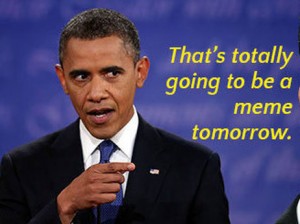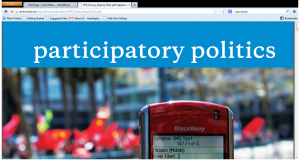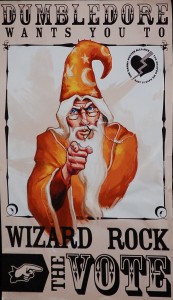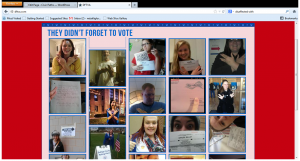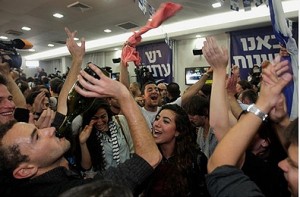One of the strands of theory that I’m both fascinated, and somewhat frustrated by, is that on “changing models of citizenship”. The basic premise of this loose paradigm is that conceptions of what it means to be a “good citizen” are changing, particularly for young people. According to this, in the past, being a good citizen meant mostly participating out of a sense of duty or obligation. The main things a citizen was required to do was to be informed about politics, and to participate through institutions—and particularly, vote in elections. For young people, however, this seems to be changing—or so claim some scholars. Young people today see a good citizen as one who is intent on communicating their unique voice, and participating in ways that express their identity. They would thus be more attracted to expressive civic acts, such as writing a blog post, sharing a political meme, or creating a political video, than to “in-the-box” participation such as voting.
In my research with youth involved in new kinds of civic groups (primarily the Nerdfighters and Harry Potter Alliance), I find that these theories resonate, but only partially. Indeed, I am hearing of new forms of engagement that are very much about self-expression: young people do post about their opinions on Tumblr and they do engage in political rants (sometimes) on YouTube videos. At the same time, those that are politically and civically interested seem to express this both through these innovative venues, but also in more “traditional” ways such as voting. This echoes the findings of the national survey on Youth & Participatory Politics, that found that those who engage in more innovative forms of “participatory politics” (“interactive, peer-based acts through which individuals and groups seek to exert both voice and influence on issues of public concern”) tend to also engage in more traditional, institutional politics, including voting (though for an interesting exception, see Liana Gamber-Thompson’s work on Libertarian youth and categorical non-voting).
In fact, what I find in my research is that many young people are frustrated with campaign politics and with politicians.
As Lisa (20) describes it:
“when I think political the first thing I think is just all of our ridiculous races for our president that happened in this country. And I think that’s another term that tends to have a negative connotation for me like people talk about, ‘Oh, don’t be political.’”
Ellen (20) adds:
“When I think politics, I think of a bunch of white guys losing their hair with a lot of money and saying a lot of stupid things”.
Youth are turned off by the bickering side of politics, by the feeling that politicians are only interested in being re-elected.
At the same time, while the young people I talked to are frustrated with politicians, and while they want to engage their activism in self-expressive ways, there is also an understanding that in the current political system, voting is an indispensable way to voice your opinion.
Enid (24) says:
“I think it’s important to go out and vote. I am one of those people who believes in if you don’t vote, then you have no reason and no right to complain if things don’t turn out the way you wanted.”
This notion is further reinforced by the groups to which these young people belong. In the context of the 2012 elections, the Harry Potter Alliance held a “Wizard Rock the Vote” campaign, where members registered voters at Wizard Rock (Harry-Potter themed music) concerts around the country. The Nerdfighters launched their DFTVA – Don’t Forget to Vote, America – campaign, where Nerdfighters around the nation submitted pictures of themselves at a polling place doing the Nerdfighter gang sign and received “DFTVA” stickers.
How does self-expressive engagement live alongside more limited, “in-the-box” participation such as voting? Perhaps the key to this question is that voting does not necessarily have to be perceived as narrowly as one individual casting a single ballot that may or may not have any effect. When the groups they belong to frame voting as a community-based act, and one that has significant effects on shaping the current political environment, we see that many young people are voting, even as they may continue to voice their disaffection with politicians in more creative and self-expressive ways.
And – a last minute P.S. for a global view…
In Israel, my home country, elections took place yesterday (January 22, 2013). At the culmination of what was generally deemed a “sleepy campaign season”, a veritable drama occurred. It began with surprisingly high voting rates (66.6%), higher than the last two elections. Israelis, who in the summer of 2011 participated in a wide-spread youth-led social protest over living costs and inequality (a predecessor to the Occupy Wall Street protests in the US) showed that the political agenda has not completely vanished, and translated the protests in the street to the polling booths. The high voting rates, including those of young people, were attributed both to concerted efforts on behalf of the political system to encourage voting, and to grass-roots mobilization, much of it on social networks. On the institutional side, a memorable ad showed a “whining police”, that told those who “whine” about the country is run (a popular pastime in Israel) that their right to whine is withdrawn for 4 years if they haven’t voted in the elections. On the grass-roots side, Facebook feeds were filled by young citizens’ declaration that they had voted and their call for others to do the same, as well as the circulation of political memes and jokes urging political participation. And the outcome? In what came as a surprise to pollsters and political pundits, citizens gave a resounding boost to a new centrist party, led by a popular journalist and rookie politician, whose political agenda focused on the same issues that were raised in the popular protests of 2011. Globally, too, elections may be another way to self-express.
More about changing models of citizenship:
Bennett, W.L. (ed.) (2008). Changing citizenship in the digital age (pp. 1-25). Civic life online. Cambridge, MA: MIT Press.
Dalton, R.J. (2009). The good citizen: How a younger generation is reshaping American politics. Washington, D.C.: CQ Press.

